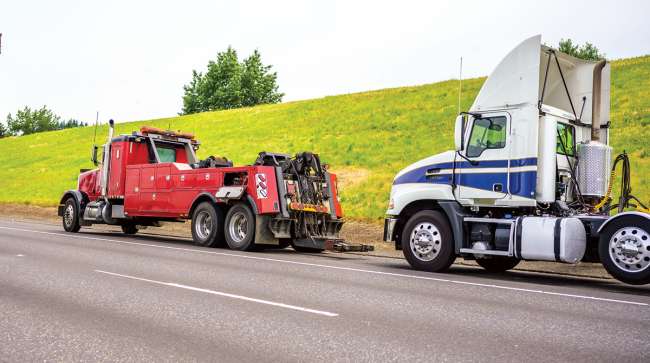Staff Reporter
New Ohio Towing Fairness Law Takes Effect in April

[Stay on top of transportation news: Get TTNews in your inbox.]
Ohio Gov. Mike DeWine signed a law Jan. 8 creating a process to resolve disputes over high invoices for towed commercial vehicles in legislation backed by state truckers and towers. The law, which takes effect April 9, creates legal remedies regarding towing commercial motor vehicles after an accident.
Under the measure, the owner of a towed motor vehicle can bring civil action against a tower or storage facility regarding recovery of the vehicle, cargo or personal contents, or if the owner disagrees with the billing amount for those services.
The law enables a vehicle owner to start a civil action on behalf of themselves or a third party for whom they commercially transport cargo to object to the amount billed by a towing service or storage facility after an accident.
Additionally, a towing company or storage facility can initiate civil action against a motor vehicle owner to force payment of towing and storage fees after 46 days from the date an owner received a bill.
The legislation, sponsored by state Sen. Al Cutrona (R), was contained in House Bill 403 among a package of motor vehicle-related changes to state regulations that received widespread bipartisan support. Co-sponsors included Republican Sens. Jerry Cirino, Terry Johnson, Stephanie Kunze, Nathan Manning, Bill Reineke and Shane Wilkin and Democrats Sens. Hearcel Craig, William DeMora and Catherine Ingram. The Senate passed the bill without opposition Dec. 18. In the House, the bill encountered minimal opposition, also passing the same day on an 84-5 vote.

Cutrona
Cutrona noted when introducing the legislation in April that it was the result of the Ohio Trucking Association and the state’s two towing and recovery associations discussing a “very contentious issue between these two industries” with a shared commitment to “create a simple, fair and expedited form of dispute resolution to deal with towing and recovery bills deemed to be excessive by the trucking industry. Both industries aimed to keep commerce moving swiftly, address payment to the towing industry for services they provide law enforcement clearing highways and roadways when a major accident occurs, and deal with property as a result of these accidents.”
Cutrona commended OTA and the towing groups for creating the dispute resolution process within the legislation so that both sides “know the ‘rules of the road’ if they cannot agree on a final bill when these major accidents must be cleared from our roadways to ensure the traveling public’s safety. Vehicles, property, cargo and payment to the towing service will be dealt with expeditiously to ensure we keep commerce moving.”
Want more news? Listen to today's daily briefing above or go here for more info
The new law states that if a motor vehicle owner disagrees with a towing or storage bill and files a complaint, they must list and pay the undisputed billing amount. For the disputed amount, the owner must explain the problem, provide evidence and post a bond equal to the disputed amount.
Then the tower or storage facility must release the motor vehicle, cargo or personal property within two business days after receiving payment of the undisputed amount cited in the complaint or answer to the civil action.
A judge will decide how much, if any, of the disputed amount should be paid from the bond posted by the vehicle owner to the towing company or storage facility.
“The court may also require either party to pay or refund any additional amount and may impose any monetary penalties that the court determines to be appropriate,” the law states.

Balzer
Tom Balzer, president and CEO of OTA, testified in support of the legislation. He told state lawmakers that under current practice in a commercial vehicle accident or towing situation, a trucking company must usually dispute fees “they feel are exorbitant. The towing company, in turn, holds the property of the trucking company until the dispute is resolved, forcing the trucking company to either eat the cost of the high fees to get back on the road, or risk not being able to complete their contract on time while the truck, the trailer and its contents are held by the towing company.”
Balzer said the streamlined process benefits both parties by separating billing disputes from cargo movement.
“This allows for the dispute to continue without a significant delay in getting the cargo where it needs to go,” Balzer explained. “This solution is a common-sense, straightforward solution to a problem that exists on a regular basis.”
Joe Hollabaugh, vice president of Shumaker Advisors and representing the Association of Professional Towers - Ohio, backed the measure.

Hollabaugh
“Neither the law enforcement entity, nor the state, county or local governmental entity is required to pay the towing company for providing the services. The only avenue for towing companies to be paid for their services is through the vehicle owner — in this case the trucking company,” Hollabaugh said.
He said he favored the new law and hoped it would encourage parties to settle disputes before going to court. “Significantly, vehicles, property, cargo and payment to the towing service will be dealt with expeditiously to ensure we keep highways safe for the public and commerce moving,” he added.




